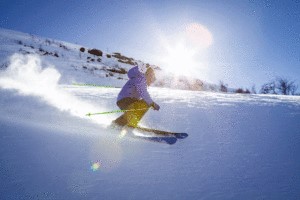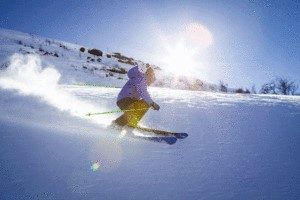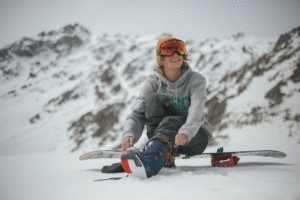- Schedule Online | Patient Login | Call or Text
- (734) 725-2020
- info@blinkmichigan.com

Experience The Great American Eclipse
August 7, 2017
Help Infants See
May 14, 2018Winter sun protection might seem like an oxymoron. But as I watch the athletes compete in the 2018 Olympic Winter Games, I’m reminded just how important UV protection is for the eyes even during the winter.
Reflected UV
In Michigan, it hardly seems like we see the sunshine in the winter. When we do, snow is usually covering the ground. That snow reflects back up about 80% of the UV radiation that hits it. Compare that to the green grass in the spring that reflects only 10%. This means that although there is less UV radiation from the sky, we get more bouncing back up off the snow covered ground.
Changes In Altitude
The Midwest is relatively flat, but if you take a vacation somewhere on higher ground, remember for every 1,000 feet you change in elevation, UV exposure increases by 10%. This happens because as elevation increases, the earth’s atmosphere becomes thinner and less able to filter out UV radiation. For example, the Olympic skiers in PyeongChang are exposed to an extra 20-30% more UV than Detroit, just based on altitude.
Snow Blindness
What happens when you don’t protect your eyes from the sun during winter? The most common condition is photokeratitis, also known as, snow blindness. The excessive UV exposure can cause swelling of your cornea. It’s like having a sunburn on your eyes. This often causes light sensitivity, tearing, redness, and a sandy or gritty feeling. Luckily, for most people these symptoms go away on their own in one to two days.
UV Protection For Performance
UV protection is important, but the athletes also consider how sunglasses or goggles will improve their sports
performance. Watch the ski slopes and you’ll notice a multitude of colors on the Olympic athletes’ goggles. For bright conditions grey tints are best. In lower light and hazy conditions yellow or orange are ideal to sharpen vision. Amber or rose are great for contrast during partly cloudy conditions. Adding a mirror coating isn’t just for looks, it also helps reflect more glare.
Whether you participate in winter sports or not, make sure you protect your eyes from the winter sun. Take a lesson from an Olympic athlete, one pair of sun protection (glasses or goggles) won’t cover you for all conditions.



